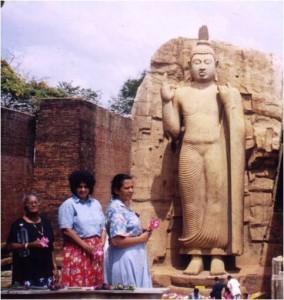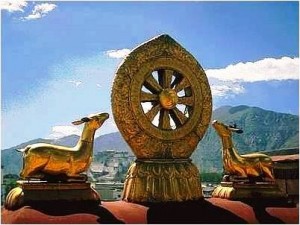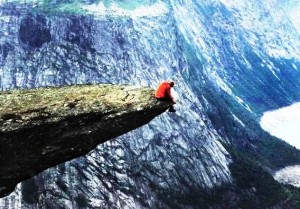Realistic Approach to Buddhism
Posted on March 20th, 2011
Article 4
The key approaches to Buddhism are self-exploration and purification of the mind, leading to development of Wisdom.ƒÆ’-¡ƒ”š‚ Buddha concluded that persistent unrest in our minds occur as a natural consequence of the human consciousness, and our inability to distinguish between the duality of not-me and me.ƒÆ’-¡ƒ”š‚ Our dis- synchronous firing of brain neurones is responsible for both chaos as well as creativity.ƒÆ’-¡ƒ”š‚ Consequently we get attached to worldly material created by our perceptions.ƒÆ’-¡ƒ”š‚ We want
such to be pleasant, complete, and permanent.ƒÆ’-¡ƒ”š‚ Yet, all are in flux and impermanent.ƒÆ’-¡ƒ”š‚ What we preserved as ƒÆ’‚¢ƒ¢-¡‚¬ƒ…-meƒÆ’‚¢ƒ¢-¡‚¬ƒ”š‚ is composite of nothing more than many consequences and energy.ƒÆ’-¡ƒ”š‚ We get sick, and death comes, and the change is universal.
Buddhism in India:
In various countries, Buddhism was adapted to the culture and to meet the needs of the society.ƒÆ’-¡ƒ”š‚ In addition to the great teachings of the Buddha, this adaptability is another reason how Buddhism survived over 2,600 years.ƒÆ’-¡ƒ”š‚ With such adaptations, the practices are not identical in different countries.ƒÆ’-¡ƒ”š‚ Buddhism in fact, became predominant in India only after Asoka (Dharmasoka) became Emperor.ƒÆ’-¡ƒ”š‚ Buddhism spread from India to many neighboring countries, but did not compete with other religions.ƒÆ’-¡ƒ”š‚ Several centuries after king DharmasokaƒÆ’‚¢ƒ¢-¡‚¬ƒ¢-¾‚¢s demise and following the Muslim invasion in India, Buddhism gradually declined.ƒÆ’-¡ƒ”š‚ Subsequently, Nalanda University, the largest and the first recognized university in history, was burnt down.
As in many countries, in India, there were rationalist, progressive, political, non-aligned movements that idolized and supported good virtues or Saddarma (see Religion of the Modern Buddhist, by L. Narasu).ƒÆ’-¡ƒ”š‚ However, at some point in history, because of deep-rooted ritualistic beliefs and entrenched cultural practices, such movements were pushed out of the mainstream.ƒÆ’-¡ƒ”š‚ Even great visionaries such as venerable Anagarika Dharmapala did not have much success in restoring or propagating Buddhism in India.ƒÆ’-¡ƒ”š‚ Deep-rooted apathy, dominant Hindu beliefs, powerful caste systems, and extreme suppression of Buddhism by the Colonial rulers did not help in overcoming ignorance or leadership development.
In contrast, when Dr. Ambedkar started to propagate Buddhism, he focused his help on the suppressed people of India (ƒÆ’‚¢ƒ¢-¡‚¬ƒ…-the untouchablesƒÆ’‚¢ƒ¢-¡‚¬ƒ”š‚), working among the so-called low-caste people.ƒÆ’-¡ƒ”š‚ He judiciously used Buddhism as a ƒÆ’‚¢ƒ¢-¡‚¬ƒ…-mass social justice and education movement,ƒÆ’‚¢ƒ¢-¡‚¬ƒ”š‚ one that found success particularly in empowering women and establishing family planning.ƒÆ’-¡ƒ”š‚ Thus, Dr. Ambedkar was able to approach the common and suppressed Indians and assist them tremendously.ƒÆ’-¡ƒ”š‚ Such a model could be adopted in other countries to help the poor and needy.ƒÆ’-¡ƒ”š‚ However, in parallel, these vulnerable people also need economic assistance, poverty alleviation, job creation, and uplifting of their social well-being and living standards.
Buddhism and the West:
Buddhism and its teachings is the ideal path to quench thirst of knowledge.ƒÆ’-¡ƒ”š‚ Thus, not surprisingly, it is the fastest growing religion in the West and among the intellectuals.ƒÆ’-¡ƒ”š‚ Regrettably, most of the audio-visual and written information available on Buddhism (in printed and electronic formats) are too complex or are made more complicated than necessary, thus preventing its usefulness and dissemination.ƒÆ’-¡ƒ”š‚ This does not help in the learning processes of those seeking to learn Dhamma and practice Buddhist meditation.
It is important to note that Buddhism is not in any way connected with, or adapted from, Hinduism or any other religion.ƒÆ’-¡ƒ”š‚ This philosophy was initiated by the Buddha.ƒÆ’-¡ƒ”š‚ For a detailed explanation, please read the writings of Lal Mani Joshi, Periyar, Dr. Ambedkar, Jamanadasa, and Venerable Palane Vajiranana.ƒÆ’-¡ƒ”š‚ An increasing proportion of Buddhist intellectuals, especially in the West embarked on meditation and Dhamma, while rejecting rites and rituals.ƒÆ’-¡ƒ”š‚ Pure Buddhism is devoid of artefacts, gimmicks, and materialism.ƒÆ’-¡ƒ”š‚ People worldwide are beginning to consider Buddhism as the real alternative to extremesƒÆ’‚¢ƒ¢-¡‚¬ƒ¢¢”š¬‚a way to develop peace within and a way out of the suppression of classism.ƒÆ’-¡ƒ”š‚ However, it is not a means to get rich or to achieve materialistic goals.
Buddhism and Tolerability:
The fairness and tolerance embedded in Buddhism allows adapt and foster the prevailing spiritual and cultural practices and belief systems in each country.ƒÆ’-¡ƒ”š‚ This way, Buddhism incorporated all that was of value in local culture and practices as additions to Buddhist practices. ƒÆ’-¡ƒ”š‚ Albeit the fundamentals are the same, this is perhaps the key reason for the divergences of
the practice of Buddhism in various countries.ƒÆ’-¡ƒ”š‚ The core principles and Buddhist philosophy have remained intact in all sectors of Buddhist teachings for the past 2,600 years.ƒÆ’-¡ƒ”š‚ It is important to understand that the rituals (bali, thovil, knnalaw, etc.) and worship additions are neither essential nor true Buddhist practices, but are the result of the above-mentioned cultural adaptations to suit local environments.
Nevertheless, these practices and rituals have not usurped the fundamental teachings of the Buddha, which are important in all Buddhist sectors and countries.ƒÆ’-¡ƒ”š‚ These core teachings are the Middle Path, the Four Noble Truths, and the Noble Eightfold Path.ƒÆ’-¡ƒ”š‚ These go hand in hand with the emphasis on self, mental cultivation and development of generosity, moral virtue, and mind development.
ƒÆ’‚¢ƒ¢-¡‚¬ƒ…-Let no one deceive another or despise anyone anywhere, through anger or irritation wish for another to suffer.ƒÆ’‚¢ƒ¢-¡‚¬ƒ”š‚ƒÆ’-¡ƒ”š‚ Sutta NipƒÆ’-¾ƒ”š‚ta I, 8.
Not Relying on External Beings:
PeopleƒÆ’‚¢ƒ¢-¡‚¬ƒ¢-¾‚¢s dependency on external entities increases when they are less self-confident and are relying on gods.ƒÆ’-¡ƒ”š‚ In parallel, the fundamentals of the Buddhist teaching of individualƒÆ’‚¢ƒ¢-¡‚¬ƒ¢-¾‚¢s self-reliance begin to fade. ƒÆ’-¡ƒ”š‚ Such a person would begin to think, ƒÆ’‚¢ƒ¢-¡‚¬ƒ…-I have no control. I have no confidence in myself, so I have to rely on an external entity.ƒÆ’‚¢ƒ¢-¡‚¬ƒ”š‚ƒÆ’-¡ƒ”š‚ If something coincidentally happens in
their favour, they become convinced that everything happens because of his or her prayers and a god or a deity.ƒÆ’-¡ƒ”š‚ These chance acts reinforces their beliefs that external beings control everything, including their lives.ƒÆ’-¡ƒ”š‚ Especially when people are desperate, they will try to do anything to overcome the negative circumstances, including seeking help from divine powers through bali-thovil (tovil), yak-natum (folk religions), and poojas. ƒÆ’-¡ƒ”š‚ Only people who would be potentially benefitted are those who perform these activities (kattadiyƒÆ’†’ƒ”š‚¢s, kapuvas, and kapuralas).ƒÆ’-¡ƒ”š‚ Realistically, there are no miracles, just co-incidences.
There are various gods such as Kataragama, Vishnu, Pattini, Natha, Ganesh, Dadimunda and others; they are thought to be positioned in devala and even thought to ƒÆ’‚¢ƒ¢-¡‚¬ƒ…-possessƒÆ’‚¢ƒ¢-¡‚¬ƒ”š‚ people.ƒÆ’-¡ƒ”š‚ ƒÆ’-¡ƒ”š‚ Some people even claim to represent the god Suniyam (Huniyan) and Kaliamma, as well as demons who are alleged to have powers to destroy other human beings, or use prayers to try to influence other people and their decisions.ƒÆ’-¡ƒ”š‚ Some even engage in fortune-telling as a livelihood.ƒÆ’-¡ƒ”š‚ They will tell you how to win the lottery, but they cannot win one!ƒÆ’-¡ƒ”š‚ These practices are not part of authentic Buddhism.ƒÆ’-¡ƒ”š‚ Buddhism teaches nothing but the reliance on self.
Cultural and Social Adaptation:
There are no Buddha statues or a Buddhist place of worship in kovil, mosques, or churches.ƒÆ’-¡ƒ”š‚ Whereas, symbols of other religions and beliefs are common in some Buddhist temples.ƒÆ’-¡ƒ”š‚ Why such discrepancy?ƒÆ’-¡ƒ”š‚ What would be the right action to keep the authenticity of the Buddhism intact?ƒÆ’-¡ƒ”š‚ Separation of non-Buddhist entities, such as devala, from the Buddhist vihara setting is not racial or ethnic desegregation.ƒÆ’-¡ƒ”š‚ It has become necessary to prevent further dilution of Theravada Buddhism and preservation of its authenticity of it for future generations.
Nevertheless, because of the cultural and societal adaptations over the years, these have become a part of many Buddhist temples.ƒÆ’-¡ƒ”š‚ In spite of these, the majority of the Buddhist temples and canters around the world are doing a remarkably good job in educating the public, carrying out meditation sessions and enhancing the practice of Dhamma.ƒÆ’-¡ƒ”š‚ However, some have become excessively political, cultural or ethnic ƒÆ’‚¢ƒ¢-¡‚¬ƒ…-symbolsƒÆ’‚¢ƒ¢-¡‚¬ƒ”š‚ that have strayed on to a mistaken path of Wrong Views (mithya dustika). Fruitless activities such as bali and thovil can only harm people psychologically and economically.ƒÆ’-¡ƒ”š‚ Overall, worship of devas is harmless, but not the right path to Wisdom as taught by the Buddha, or to attain nibbana.
As explained above, it is unfortunate that some key establishments are degenerating to a point where they may not fit in the BuddhaƒÆ’‚¢ƒ¢-¡‚¬ƒ¢-¾‚¢s Dispensation.ƒÆ’-¡ƒ”š‚ ƒÆ’-¡ƒ”š‚ If monks neglect to acquire and sustain the Three Refuges and do not adhere to Precepts, it is no wonder that some laypeople (dayaka daikavos) who may not necessarily adhere to Dhamma, but attend such temples may be misled and follow suit.ƒÆ’-¡ƒ”š‚ Regrettably, similar activities are also taking place in some Buddhist homes.ƒÆ’-¡ƒ”š‚ ƒÆ’-¡ƒ”š‚ We need to think hard on what we are engaged in and what our goals are.ƒÆ’-¡ƒ”š‚ As individuals, it is not too late to revert back to the Right Thinking and the Right Path of actions.ƒÆ’-¡ƒ”š‚ ƒÆ’-¡ƒ”š‚ Where such negative trends or entrenchment of materialism transpire, we hope these will be reversed soon.ƒÆ’-¡ƒ”š‚ The Buddhist Community should be mindful of these situations.
The next article (# 5) will review devotional faith.
ƒÆ’‚¢ƒ¢-¡‚¬ƒ…-As rust, arisen out of iron, eats itself away, even so his own deeds lead the transgressor to the states of woeƒÆ’‚¢ƒ¢-¡‚¬ƒ”š‚ (Dhammapada)
Note: Some of the material, pictures, poems, and stanzas in these writings may have been published previously, including on the Internet (such as http://what-buddha-said.net and Buddha.direct.net) or obtained from various sources (modified with permission).ƒÆ’-¡ƒ”š‚ The author sincerely thanks all contributors of such materials for their generosity.
We anticipate that the brief articles on meditation, Buddhism, and Buddhist philosophy that appear in this column will initiate healthy and positive discussions.
May the Noble Triple Gem bless you
Sunil J. Wimalawansa
Professor of Medicine, Endocrinology, Physiology & Integrative Biology
ƒÆ’‚¯ƒ”š‚»ƒ”š‚¿






March 21st, 2011 at 3:53 am
We thank Prof.Wimalawansa for his article clarifying Theravada Buddhism. We agree that various ‘additions’ that is not truly Buddhist be gently removed from Buddhist Temples. Proper Meditation should be taught in every Temple by knowledgeable monks who themselves practice Meditation. We also suggest that poor Buddhists be helped in their material needs by well organised Buddhist associations/organisations with much wider scope – this would prevent future conversions to other religions.
If Hindu people are wise, they would help with the material needs of their poor too through the re-establishment of the earlier RamaKrishna Missions, and teach their followers Raj Yoga (Meditation), and the beauty of the other Yogas.
March 21st, 2011 at 8:12 am
Here is another interesting point I would like to add :
The design on the Indian Flag is the Dhamma Chakra of Buddhism. Also, the national motto of India is “Satyameva Jayate,” which translates from the Sanskrit into English as “Truth alone triumphs.” This too is from the Buddhist scriptures. Truth/God/Brahma are all different words for the same other dimensional Source of Eternal Life/Nirvana etc.
March 22nd, 2011 at 1:39 am
The Prof. has written this article with good intensions and I respect his views. What is needed from academics is analysis of our decline and lessons to learn from our history so that mistakes are not repeated rather than more on Buddhism, which is not even practiced in the source country India. Can any one kindly tell me where true Buddhism exist today and who can define true Buddhism, bearing in mind that all believers of various religions claim that their belief is the truth. I have given alternative views, produced in a short time, for a balanced approach. Self exploration, purification of mind, precepts, meditation and middle path are certainly good things in Buddhism. However Buddhism has failed to recognise that there are nasty non Buddhists with no Buddhist values who will attempt to eliminate the Buddhists. As the minds Buddhists are programmed to be passive and non violent they become easy targets of violent non Buddhists such as Prabakaran and Hitler and so on.. Historical evidence is that the Portuguese, Dutch, British, Muslims and Tamils took advantage of passive , weaker people and killed them or eliminated them by various means. We can see that happening in the modern world as well. The evidence is the manner in which Buddhism and Buddhists were wiped out at Nalanda and other previously Buddhist countries in the Silk route. Birth, development, aging, disease and death are facts of nature since living species, including bacteria and viruses evolved from cells and have to evolve and compete for resources to survive. We can respond to this fact of nature in one of two ways: get depressed about it and do minimum and seek extinction or realise that it is a natural process and be as productive as possible until the last day. Some prefer the former method whilst some others prefer the latter method. My view is being productive is better. In a highly competitive world, the depressed and non productive groups may easily be beaten by the productive group.
Buddhism in India and China
Buddhism suited the needs of the people living in an era 2500 years BC. We now live in a global highly competitive world and if we are not competitive enough, we may end up as second class citizens or doing menial work. Present day requires a new approach, that is suitable to the modern world rather than use the same approach that was suitable 2500 years ago.
Whilst the Indians and the Chinese followed various religions, for centuries, including Buddhism, they were behind Western nations in terms of power, wealth, scientific knowledge, economic activity etc and they became victims of aggressive Western and Muslim nations. Within 60 years of dumping religion and becoming secular, both China and India have become powerful, wealthier, advanced in science and technology. Ddumping religion as well as new thinking on economics liberated them. New thinking on economics make use of greed of people to produce the driving force, without attempting to suppress desires as in Buddhism. For what ever reason, Buddhism has been wiped out from countries in the silk route, Malaysia, Indonesia and so on and it is only the sea that prevented Lanka from being Muslim. If Muslim invaders managed to invade Lanka, many academics would have written articles on the virtues of being a Muslim. It is worthwhile knowing that religion is a strong mind controlling mind virus and prevents people from thinking rationally.
We can learn from Indians and the Chinese, to dump religion, become secular and move forward.
.Buddhism and the West
For any one who wants to ‘quench thirst for knowledge’ science is a better source than religion, as science relies on theories and evidence where as religion relies on belief, usually with no evidence. There is no evidence for Nirvana and Sansara or rebirth. Both Nirvana and rebirth, are ancient concepts that existed in Hinduism. Nirvana also existed in Taoism. Hindu Nirvana is to join Gods, and Tao Nirvana is to become a Tao, both safer than attempting to extinguish one’s self permanently. Quotes from well known people on religion are given below: Arthur C. Clarke
The famed science fiction writer, Arthur C. Clarke, who once denigrated religion as “a necessary evil in the childhood of our particular species,”
Bertrand Russell
ref: http://www.positiveatheism.org/hist/russell2.htm
My own view on religion is that of Lucretius. I regard it as a disease born of fear and as a source of untold misery to the human race. I cannot, however, deny that it has made some contributions to civilization
Albert Einstein
A man’s ethical behavior should be based effectually on sympathy, education, and social ties and needs; no religious basis is necessary. Man would indeed be in a poor way if he had to be restrained by fear of punishment and hope of reward after death. (Albert Einstein, “Religion and Science”, New York Times Magazine, 9 November 1930
Clearly, famous scientists are not in favour of religion.
Fastest growing religion in the West.
It is evident from the closing down of a large number of Churches that religion is declining in the West. Muslims claim that the Muslim religion to be the fastest growing religion. So the claim that Buddhism is the fastest growing religion is controversial..
May the enemies of the Singhalese achieve Nirvana.
March 22nd, 2011 at 8:20 am
Dear Ben,
Your perseverance is admirable ! However, we beg to disagree with you, every time !
Here’s a list of famous American Buddhists who agree with us. There are probably many more not listed here :
Ernestine Anderson – jazz singer
Laurie Anderson – performance artist
Kate Bosworth – actress
Orlando Bloom – actor
Susan Blackmore – parapsychologist, Zen Buddhist, ghost buster, professional skeptic
Cora L. E. Christian – Black female doctor who was an independent candidate for Governor of U.S. Virgin Islands, 2002.
Leonard Cohen – Canadian poet, novelist
Rob Cohen – film director
Dadon Dawadolma – singer, actress
Diane di Prima – Feminist poet
Nathaniel Dorsky – filmmaker
Richard Gere – actor, movie star
Goldie Hawn – Oscar-winning actress
Frank Herbert – science fiction writer famous for Dune series
Becky Johnston – author, screenwriter
Phil Jackson – basketball coach
Jack Kerouac – poet, writer
George Lucas – film producer, director (“Star Wars”)
Jennifer Lopez – singer, actress
Joanna Lumley – actress
Melissa Mathison – screenwriter
Tano Maeda – filmmaker
Me’shell Ndegeocello – musician, songwriter
Bruce Joel Rubin – screenwriter
Keanu Reeves – actor
Michael Stipe – musician
Oliver Stone – film director
Patti Smith – rock star
Steven Seagal – actor
Renee Tajima-Pena – filmmaker
Tina Turner – singer
Uma Thurman – actress
Babeth VanLoo – filmmaker
Gene Vincent – rockabilly musician
Mark Wahlberg – rap singer, actor
Alice Walker – author, The Color Purple
Ruby Wax – actress, comedienne
Adam Yauch (MCA of the Beasties) – rap singer
And there are hundreds of Buddhist people of fame other than these Americans. These people prove the rule : Buddhism properly understood and practiced, works very well !
Now, back to our Debate. Buddhism is not a religion, but a Philosophy. As we live & then die, Buddhism addresses these points completely. If we do not question life & death, we are mere zombies, machines that have no feelings, robots that will do tasks and die. Life is to be enjoyed to the fullest within certain laws in the nature of things. That is the pure Buddhism. In dying & death, there should be no fear. These are the questions Buddhism addresses. What could be higher learning than this ?
However, I agree with Ben that Lankans in general have to learn more Science & Technology. But, Science alone will never satisfy the human Heart & nor even the Mind. The human mind which learns Science only is puny compared to learning the higher nature of things.
The recent disaster in Japan with the triple tragedy of earthquake, tsunami & the nuclear plant blow up, proves the point. The Janpanese culture (basically Zen Buddhist) is helping the people to stoically accept the nature of things. At this point, we might add that solar & wind power are far safer than nuclear power. Also, it is now questioned whether fracing (a procedure) for oil exploration, may be responsible for some earthquakes.
March 23rd, 2011 at 3:11 am
I AM DISTRAUGHT & CONFUSED BY THE OPINIOINS EXPRESSED ABOVE. HOW COULD
A TRUE BUDDHIST WHO DILIGENTLY FOLLOWS THE PHILOSOPHICAL TEACHINGS OF THE LORD BUDDHA, AND ENDEAVOURS TO FOLLOW THE MIDDLE PATH, RENOUNCING THE WORLD AND MORE OR LESS LIVING A MEDICANT’S LIFE LAY CLAIM TO FAME AND FORTUNE.
THE ERECTION OF A HUGE BUDDHIST STATUE HAS COMMENCED IN SRI LANKA AT AN ENORMOUS COST AND WOULD WHOEVER’S NAMES THAT ARE FINALLY ENGRAVED AS THE DONORS ON THE PLAQUE AT THE FOOT OF THIS GIGANTIC STATUE. ATTAIN NIRVANA OR BUDDHAHOOD, FOR THEIR MAGNANIMOUS CONTRIBUTION TO GAIN A PASSING FAME IN THEIR ENDEAVOUR TO HAVE THEIR NAMES LIVE ON FOR ETERNITY.
WHITHER THEN THE TRUTH OF ENTERNAL DECAY – WOULD THESE QUESTIONS HAVE BROUGHT A SMILE TO THE LIPS OF ARAHAT MAHINDA ?
March 23rd, 2011 at 3:49 am
Buddhism is suitable in an ideal world. Unless we learn how to deal with competition and nasty people we may be doomed. A simple look at population distribution in Lanka would indicate our precarious position. Instead of thinking about arresting our decline some writers tell us more Buddhism that has neither worked in Lanka and many other countries. Before SWRD, we were just second class citizens in our own country. Such a patriot was destroyed by a Buddhist monk. The Indians and the Chinese have shown us the way forward and also thinkers such as Einstein and AC Clark. The Indians realised correctly that Buddhism will not make them safe, after the Nalanda experience. Indians have learnt to be competitive and win after dumping dogmas that promote extinction and giving up desires. We should have learnt some lessons after suffering several invasions and getting killed by Tamils and living as second class citizens before SWRD gave us some dignity. Recently MR saved us. However, we should rely on ourselves to see the correct path.. We should have learnt that being passive, seeking extinction and giving up desires will take us no where other than to the bottom of the food chain. In fact every passive ethnic group has been wiped out, or their assets taken by force or living as second class citizens. This fact is some thing to think about. Yet what we hear from most writers is more on Buddhism and not how to become competitive and survive and win. Once peoples mind is set on seeking extinction and giving up desires, they hardly notice external threats such as the threat posed by India to divide the country. The danger of religion is that it is a strong mind virus and prevent people from thinking rationally.
Frans has given a list of about 40, mostly Westerners who have been converted to Buddhism. Not a single one of them is a recognised person in the science field. The science people I quoted are well recognised in the science field and they have been against religion. I am not surprised that people convert to Buddhism, as Buddhism in general does not believe in God and more logical than Christianity, which is build on myths. I am a Buddhist myself and call myself a true Buddhist as I follow the Kalama sutra and precepts and so on. However some Westerners have also become Muslims. Compared to the small number moving towards Buddhism, at least 500 million Indians and perhaps equal number of Chinese have move away from Buddhism. Surely we are still not worshipping Westerners !, for them to be more important than Indians or Chinese. Surely a few Westerners cannot be better than millions of Indians or our we in the game of Westerner worshipping !.My concern is that Whilst Tamils, Muslims , Indians and Chinese make progress on the economic front, Sinhalese appear to stay trapped to 2500 years BC. At least I have done my duty and if people want to stay as second class citizens, , giving up desires and competition, then nothing could be done. Unless we are prepared to fight back there will be no religion, or Sinhalese left in Lanka, just as happened to Aztecs. I still like to know where true Buddhism is practiced.
March 24th, 2011 at 5:06 am
Dear Ben,
I agree with some things you say. However, I was under the impression that you are an admirer of the west & its high bent on science ! That is the reason why I showed the list of famous Buddhists in the west. While its true that there are no scientists in that list, it does have almost all of my favorite western actors & actresses – decent people with talent and yes, lots of MONEY ! I do not know where some folks get the impression that Buddhists ought not to make MONEY. Buddhists ought to make lots of MONEY but in the right way (Buddha: Right Livelihood, a Buddhist idea that is being espoused by many a thinking western economist).
However, here is my take on matters in Lanka.
When the Portuguese came to Lanka carrying GUNS, the local population who at first welcomed them for trade, were over run with GUNS. At that time spices were all important to the west, to preserve food as Fridges had not arrived on the scene then. It was a series of take overs after that, for tropical products & subjugated labor (Ben’s second class citizens). But Science & Technology are a must in the modern world, particularly in Medicine & Food production & preservation, and a host of other fields. The West took off in Science & Technology because of wars, adverse weather conditions & food preservation mainly, unlike in the softer weather in the East with hardly any wars and easy growing of food. The west went on to develop the atomic bombs (scientist Einstein, a Jew). While I admire his work, I do not think the products of his genius are truly life supportive viz. atomic bombs, nuclear energy. He himself had misgivings about his discovery. It is not his fault that his discovery was misused.
May I suggest that people like Ben who are qualified Scientists (Engineer) get together with like minded and concerned scientists design a program for government schools where children can enjoy learning Science & Technology from a very young age. If a subject is presented so that a child enjoys learning it and can see it in daily uses, then there is no stopping their creativity. Also, logical thinking at a young age will promote creativity and good mental health.
As to who is a true Buddhist, we have to each answer that question. There are lots of choices and any following any combination of these will produce a good Buddhist : the 5 Precepts, the Eightfold Nobel Path, the Kalama Suthra (Ben’s choice)& other Suthras, the Dhammapada, etc.etc. (Question : what makes a good Christian, a good Muslim & a good Hindu ?). In modern day Buddhism, Ritual & Chanting should be minimal.
FAMILY PLANNING A MUST IN MODERN DAY LANKA.
March 24th, 2011 at 8:16 am
Thanks Frans for your comment. I am not a follower of the West, but merely studied how they developed and raped the rest of the passive world. They have robbed the assets of every passive ethnic group. I also acknowledge the contribution they have made to science and technology. I am a follower of Kalama sutra, which is the same as science thinking. I do not mind even chanting, as long as people do not seek extinction and give up desires, as the will to survive is essential. The future is with the Chinese and the Indians. From my observation West is in a state of r decay and decline. I hope this decline is arrested as I live in te West and I earn my living there. Please watch the video Shift globalisation and comment
http://www.youtube.com/watch?v=ljbI-363A2Q
March 24th, 2011 at 11:22 am
Whatever climatic, ethnic & religious thinking shaped the west, some of their leaders are certainly aggressive about survival. Maybe Darwinian thinking of survival of the fittest, but in this case in striving to survive in the wrong manner (Salvation through Destruction per James Carroll), may bring the extinction of the human species. Even India & China are basically imitating the west in their ‘art of survival’, turning to nuclear power, or having nuclear power thrust on them.
While I agree with Ben that we must not be ‘seeking extinction’ through over indulgence in religiosity (too much ‘navel gazing’ said someone I know !), in the end, the west too will have to seek their salvation through the Core Teachings of the Masters, whatever religion. In the west, it is widely acknowledged that war does not really solve problems for human beings. War actually brings sadness, guilt & fear, and waste of resources, when needlessly applied.
I totally agree with Ben that Sinhala people must seek better ways to ensure survival in Lanka using Science & Technology in a safe manner. But, to seek solace through the Core Teachings of the Buddha (and the other Masters) too is a must.